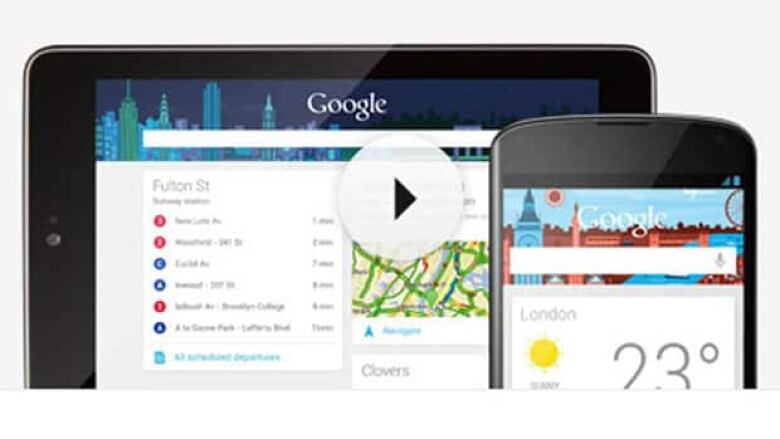Google's virtual assistant invades Siri's turf
Google releases free iPhone and iPad app that features Google Now

Google is trying to upstage Siri, the sometimes droll assistant that answers questions and helps people manage their lives on Apple's iPhone and iPad.
The duel began Monday with the release of a free iPhone and iPad app that features Google Now, a technology that performs many of the same functions as Siri.
It's the first time that Google Now has been available on smartphones and tablets that aren't running on the latest version of Google's Android software. The technology, which debuted nine months ago, is being included in an upgrade to Google's search application for iOS, the Apple Inc. software that powers the iPhone, iPad and iPod Touch. It's up to each user to decide whether to activate Google Now within the redesigned search app.
Invasion of Siri's turf
Google Now's invasion of Siri's turf marks Google Inc.'s latest attempt to lure iPhone and iPad users away from a service that Apple built into its own devices.
Google quickly won over millions of iPhone users in December when it released a mapping application to replace the navigation system that Apple dumped when it redesigned iOS last fall. Apple's maps application proved to be inferior to Google's ousted service. The app's bugs and glitches made Apple the butt of jokes and fueled demand for Google to develop a new option.
Apple has been losing to Google on other fronts in a rapidly growing mobile computing market, an arena that was revolutionized with the iPhone's release in 2007. Smartphones and tablet computers running Google's free Android software have been steadily expanding their market share in recent years, partly because they tend to be less expensive than the iPhone and iPad. At the end of 2012, Android devices held about 69 per cent of the smartphone market while iOS held about 19 per cent, according to the research firm IDC.
Google gaining ground
The rise of Android also is squeezing Apple's profit margins, and has contributed to a 40 per cent drop in the company's stock price since it peaked at $705.07 last September around the time that the iPhone 5 came out.
Android's popularity is good news for Google because the company's services are built into most versions of the operating system. That brings more traffic to Google services, creating more opportunities for the company to sell ads -- the main source of Google's revenue.
Siri is billed by Apple as an "intelligent feature." Since the technology's release in October 2011, Apple has made it a centerpiece of some marketing campaigns that depict Siri and its automated female voice as an endearing and occasionally even pithy companion.
When asked for an opinion about Google Now, Siri responded: "If it's all the same to you, I'd rather Google later."
Google believes its Siri counterpart is smarter because Google Now is designed to learn about a user's preferences and then provide helpful information before it's even asked to do so. The technology draws upon information that Google gleans from search requests andother interactions with the company's other services. Knowing a person's location also helps Google Now serve up helpful information without being asked.
'This concept of predicting your needs and showing you them at the right time is unique to Google Now.' Baris Gultekin, Google Now's director of product management
"This concept of predicting your needs and showing you them at the right time is unique to Google Now," said Baris Gultekin, Google Now's director of product management. "We want computers to do the hard work so our users can focus on what matters to them so they can get on with their lives."
If the technology is working right, Google Now is supposed to do things like automatically tell people what the local weather is like when they awaken to help decide what to wear and provide a report on traffic conditions for the commute to work. During the day, Google Now might provide an update on the score of a user's favourite sports team or a stock quote of a company in a user's investment portfolio. On a Friday evening, Google Now might offer suggestions for movies to see or other weekend events tailored to a user's interests. For international travellers, Google Now might provide currency conversion rates, language translations of common phrases and the time back home.
Most of this automatic information is provided in summaries that Google calls "cards." Like Siri, Google Now also is equipped with voice technology that allows it to respond to questions and interact with users, though it hasn't shown the wit that amuses some of Siri's users.












_(720p).jpg)


 OFFICIAL HD MUSIC VIDEO.jpg)
.jpg)



























































































